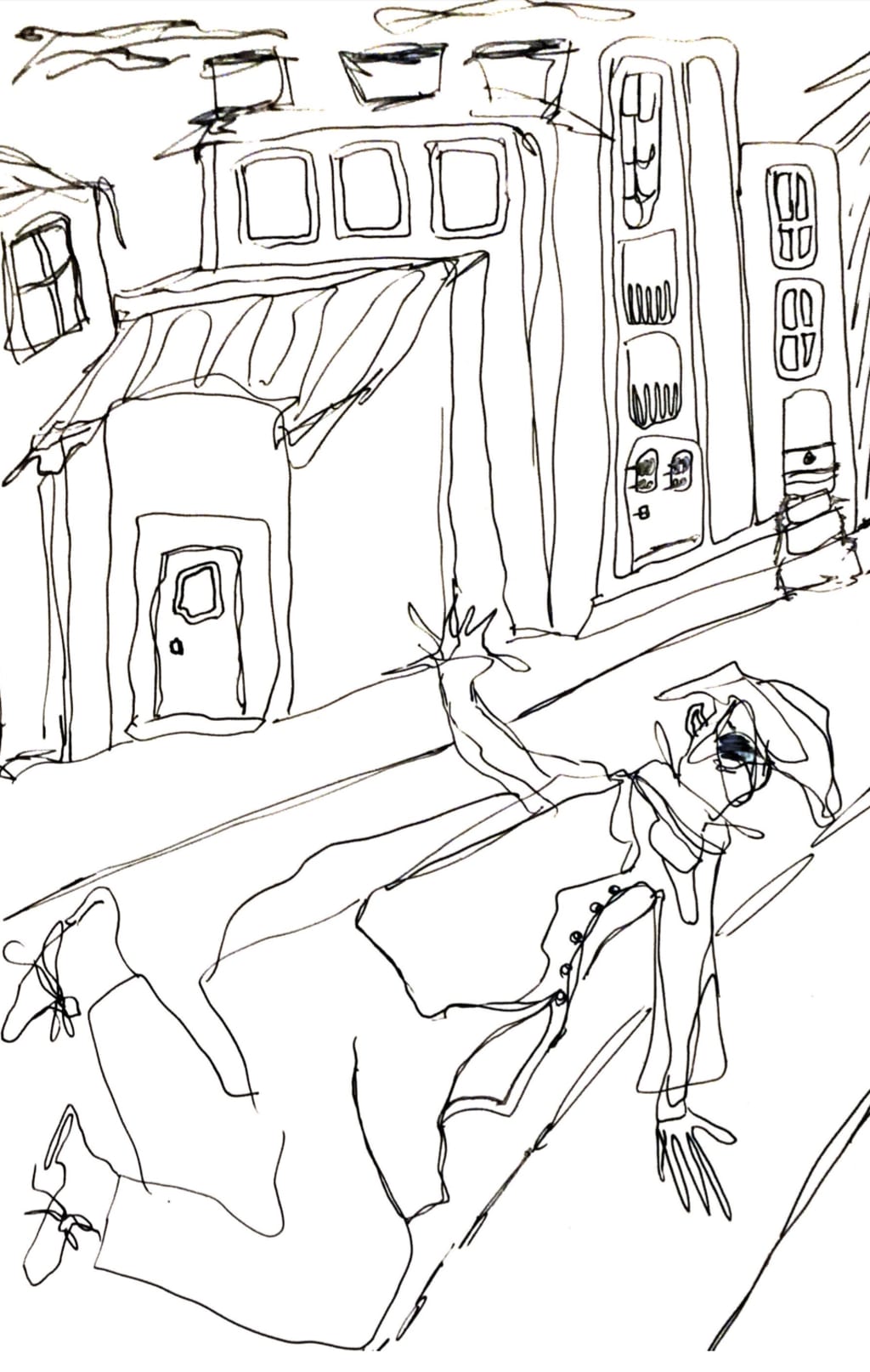URGENT WEATHER CONCERN: DO NOT RUN STOP
A short story about a quiet man named Edgar Trofsen and the 1952 Great Smog of London

The air had smelt rotten for two days. Since the light of the sun was smothered, the sky constantly evidenced an uncanny time of day, somewhere between four and five in the morning, and there was no way to see through it. At first, the smoggy pea soup was waited out, but it condensed into black slicks on the streets, greasy residue on the faces of those who dared open a window. Edgar Trofsen looked through glass to the vaguely grey color that concentrated the sky. He was in the process of transmitting a telegram, one that should concisely express the need to cancel the trains until further notice. He was irritable. They’re on a track, what should it matter, anyway? But of course he knew it was the safe thing, given such extreme conditions of visibility. The trains would not run.
With the exception of his rather large and pointed nose, Edgar’s adult appearance indicated a hardly noteworthy man, one whose curled hair was cut cheaply and whose mother was likely sometimes cruel, as it shows in fine wrinkles around the forehead. He worked as a telegraphist for the London and Northwestern Railway (L&NWR), which ran between the pastures of central England and those dignity-ridden capitals of commerce, traveling parcels daily through Rugby and up toward Camden Town.
Edgar shifted his feet beneath his chair, affording himself the balance necessary to pull open the records drawer, which was filled with documentation of all telegraph activity. His mind flickered to a locked chest of little scrolls. He’d seen them once from a distance: long, curled papers. He felt guilty, and dismissed the image in order to produce the handwritten document; the command had surely been sent.
Most of Edgar’s telegrams consisted of simple phrases tapped directly and efficiently. He communicated with the dispatcher: scheduled times of train arrival and departure, a change of schedule or meeting place. Tapping out Morse code each weekday, and sometimes Saturdays, was neither tedious nor enjoyable; it was simply duty. It was a finely paying job, though, and it kept him busy, which was really the essential thing.
Edgar did not like to relax. In fact, there was hardly, in his largely untampered memory of some thirty years, a single moment during which he was at full and complete rest. Nightly unconsciousness was another thing entirely, of course. He got plenty of sleep. But even so, Edgar never seemed to doze or fall, to lose himself within the woolen antechamber that introduces sleep, openly, the pleasure of a partial and waxing dream. No, he’d simply remove his awareness, like a candle quickly puffed out by a person without time to spare. The moments between lying and slumbering were no more relaxing than those of a mind startled awake.
Even while he was not thinking, something within Edgar hovered, gazing over a mechanical system of pulleys and levers. It watched from above, his sitting at his desk by the window, his tapping, his cheap haircut. And with Edgar’s every thought reverberated an equally intense wordless feeling, filling space until another fear or conviction would knock again at the worn door.
As a boy, Edgar had plenty to do: he fed the fish, goats, the homing pigeons and the useless ones, the stupid rabbit, wake Mam and Henry. Smack Henry if he wouldn’t, and see off Elba, the largest and most reliable homing pigeon.
Homing pigeons are worthwhile. Edgar fed them seeds and insects. His mother owned a fleet of seven, and most of them were employed each weekday to fly four miles due west into the neighboring town with bits of rolled paper, thin-wired to their legs. They’re nauseatingly loyal, the birds.
The other, duller pigeons received a bowl of worms daily; they expected their worms. They’d aim and pluck up from the bowl with their pointed beaks. Then they huck back their necks almost violently, gullets full exposed, and swallow whole. Their heads swung trustingly, down and up and back down, and up to the last worm, and then they just beaked the wooden bowl, roughly, idiot-like. Bashing their little beaks on the bowl.
But the homing pigeons knew when to stop picking up worms: namely, when they were all gone and swallowed.
Edgar was forbidden to read the pigeon post. As a child, he liked to imagine his mother was part of some secret resistance, some underground system who required this effective and highly exclusive pigeon pageantry. She called them her underlings, or her darlings, and had Edgar feed them early each morning. They always returned before sundown. Their commitment was impossibly charming, but by the time he was twelve or so, Edgar resented the beady little messengers, the cronies, and knew his mother was no revolutionary.
The dispatcher had received the gram, and responded with an affirmative tick. It was coming toward evening. Edgar would soon need to make his way back to his flat, a dreaded scene he had avoided imagining, but which still made it into his mind a dozen times or so. He lit a cigarette. Then he gathered his papers and pen, prepared his rather unwieldy coat, and wrapped a scarf about his face.
As he was dressing to go out into the smog, Edgar was suddenly stricken by the thought that the birds of London must be panicked and dying. The air was sulphuric. Surely, they’d be dying. An emotion of his presented itself as a pulsing in his legs, some sort of inclination. He pictured Henry’s pale face just then, some fifteen Decembers ago.
Edgar’s younger brother was a boy whose mind was mainly still. Henry was fourteen, but also six, and two, sometimes. Edgar went to an especially foggy and still day; the yard was groomed, the birds quiet.
“Henry! God… Damnit Henry!”
He heard his mother’s gravelly voice, sensed her blood pressure rising.
“–Have a bit of nuance for Christ’s sake. Yer most a grown man, act like you’ve got a sense of the matter, eh? For the enth time, son, you’re a damn partridge! You’re a quail, boy!”
Henry ran outside, already a little sweaty, though it was only seven or so, and a cool morning.
In his cupped hands lay a small dead bird, its wings drawn in as if resting neatly. It looked damp. Edgar watched his brother squat on the dirt, petting the thing, whispering rhythmically to it like a tiny sage. Henry began to rock back and forth, cradling the bird, which probably died untragically, some natural cause. Bird death is not news when you have dozens.
Embarrassed, not for himself but somehow for the bird, Edgar looked away, back to the cages. The moment felt forbidden. There was a small cage for the trusted carrier pigeons, and a larger crate for the others; his mother called them “duds.” He looked back to Henry, whose rocking had taken on a steady sort of pace. The boy seemed to be singing softly. Edgar thought of a nativity scene.
Mam burst out the door, vigorously wiping both hands on her apron, and stood with crossed arms, projecting herself from the patio. She liked to make her presence irrefutable. She shook her head stiffly: her bastard son, playing with dead things, the little creep, the witless one.
Edgar was enraptured and ashamed by his brother’s vicinity, by the shrine that had formed around his crouched body. For Edgar, his brother’s whispers might as well have been directed at a curled piece of paper. Henry’s bird (it was his, now) looked limp, but it didn’t really appear dead. Especially given the stillness of eye so particular to birds, Edgar could have partially convinced himself that the thing was simply relaxed. He quickly dispelled the illusion, preferring to face the evidence. But as much as he tried to distinguish the visual difference, its eyes looked the very same.
He rippled inwardly, still standing and still thinking as his mother charged.
After locking the office door, Edgar made his way now through the L&NWR building to a side exit, mentally bracing himself against the particles of coal saturating the sky. The stench was unbelievable. He gripped his briefcase tighter than usual, and he clutched the scarf up closer to his face. It was a useless gesture, just a way of occupying his other hand. There was no good way to prepare for the smog.
Edgar thought of how the trains wouldn’t be taking their routes as usual for the next several days. They would just be idling until the event ceases, marinating in the rotten air. He shuddered, and quickened his pace, determined to walk quickly and directly to his apartment. Each step, though, felt as if it was already in the past. He could not see the progress his boots would make, drawing his body further from the office building. The air was so thick, it was impossible to tell, it was impossible to plan or to figure.
He felt a familiar ache in his lower legs, extending to his ankles, and higher now, toward his knees. His feet began to pulse and press harder into the concrete, and, now, far before he knew it, he was running through the vague smog, his body pushing up against the gray of the sky. With his scarf pressed to his face, Edgar sprinted along, unworried of any crash, exhaling hard and breathing back the inevitable bits of coal. When he made it home to his flat, Edgar pounded the stair steps, burst through his door, and collapsed onto his sofa, beat and exhausted, halfway into a dream.
About the Creator
Jessica O’Brien
Poet and visual artist whose work has been recognized for its empathic portrayals of grief and grace.
Enjoyed the story? Support the Creator.
Subscribe for free to receive all their stories in your feed. You could also pledge your support or give them a one-off tip, letting them know you appreciate their work.
Reader insights
Nice work
Very well written. Keep up the good work!
Top insights
Compelling and original writing
Creative use of language & vocab
Easy to read and follow
Well-structured & engaging content
Excellent storytelling
Original narrative & well developed characters
Expert insights and opinions
Arguments were carefully researched and presented
Heartfelt and relatable
The story invoked strong personal emotions
On-point and relevant
Writing reflected the title & theme






Comments (1)
Damn, this is good!